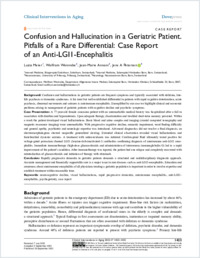Confusion and Hallucination in a Geriatric Patient. Pitfalls of a Rare Differential: Case Report of an Anti-LGI1-Encephalitis
DOKPE
- Meier, Luzia Sandra Universität Freiburg
- Annoni, Jean-Marie Universität Freiburg
- Weinrebe, Wolfram Salemspital Hirslanden Bern
- Petersen, Jens A. ORCID Neurozentrum Bern
- 26.09.2022
Published in:
- Clinical Interventions in Aging. - Informa UK Limited. - 2022, vol. Volume 17, p. 1423-1432
anti-LGI1-encephalitis
autoimmune encephalitis
case report
neurocognitive decline
psychogeriatry
rapid progressive dementia
visual hallucinations
English
Background: Confusion and hallucinations in geriatric patients are frequent symptoms and typically associated with delirium, late- life psychosis or dementia syndromes. A far rarer but well-established differential in patients with rapid cognitive deterioration, acute psychosis, abnormal movements and seizures is autoimmune encephalitis. Exemplified by our case we highlight clinical and economic problems arising in management of geriatric patients with cognitive decline and psychotic symptoms.
Case Presentation: A 77-year-old female caucasian patient with an unremarkable medical history was hospitalized after a fall in association with diarrhea and hyponatremia. Upon adequate therapy, disorientation and troubled short-term memory persisted. Within a week the patient developed visual hallucinations. Basic blood and urine samples and imaging (cranial computed tomography and magnetic resonance imaging) were unremarkable. With progressive cognitive decline, amnestic impairment, word finding difficulty and general apathy, psychiatric and neurologic expertise was introduced. Advanced diagnostics did not resolve a final diagnosis; an electroencephalogram showed unspecific generalized slowing. Extended clinical observation revealed visual hallucinations and faciobrachial dystonic seizures. A treatment with anticonvulsants was initiated. Cerebrospinal fluid ultimately tested positive for voltage-gated potassium channel LGl1 (leucine-rich-inactivated-1) antibodies confirming diagnosis of autoimmune anti-LGI1 ence- phalitis. Immediate immunotherapy (high-dose glucocorticoids and administration of intravenous immunoglobulin G) led to a rapid improvement of the patient’s condition. After immunotherapy was tapered, the patient had one relapse and completely recovered with reintroduction of glucocorticoids and initiation of therapy with rituximab.
Conclusion: Rapidly progressive dementia in geriatric patients demands a structured and multidisciplinary diagnostic approach. Accurate management and financially supportable care is a major issue in rare diseases such as anti-LGI1-encephalitis. Education and awareness about autoimmune encephalitis of all physicians treating a geriatric population is important in order to involve expertise and establish treatment within reasonable time.
Case Presentation: A 77-year-old female caucasian patient with an unremarkable medical history was hospitalized after a fall in association with diarrhea and hyponatremia. Upon adequate therapy, disorientation and troubled short-term memory persisted. Within a week the patient developed visual hallucinations. Basic blood and urine samples and imaging (cranial computed tomography and magnetic resonance imaging) were unremarkable. With progressive cognitive decline, amnestic impairment, word finding difficulty and general apathy, psychiatric and neurologic expertise was introduced. Advanced diagnostics did not resolve a final diagnosis; an electroencephalogram showed unspecific generalized slowing. Extended clinical observation revealed visual hallucinations and faciobrachial dystonic seizures. A treatment with anticonvulsants was initiated. Cerebrospinal fluid ultimately tested positive for voltage-gated potassium channel LGl1 (leucine-rich-inactivated-1) antibodies confirming diagnosis of autoimmune anti-LGI1 ence- phalitis. Immediate immunotherapy (high-dose glucocorticoids and administration of intravenous immunoglobulin G) led to a rapid improvement of the patient’s condition. After immunotherapy was tapered, the patient had one relapse and completely recovered with reintroduction of glucocorticoids and initiation of therapy with rituximab.
Conclusion: Rapidly progressive dementia in geriatric patients demands a structured and multidisciplinary diagnostic approach. Accurate management and financially supportable care is a major issue in rare diseases such as anti-LGI1-encephalitis. Education and awareness about autoimmune encephalitis of all physicians treating a geriatric population is important in order to involve expertise and establish treatment within reasonable time.
- Faculty
- Faculté des sciences et de médecine
- Department
- Médecine 3ème année
- Language
-
- English
- Classification
- Pathology, clinical medicine
- License
- Open access status
- gold
- Identifiers
-
- DOI 10.2147/CIA.S380316
- ISSN 1178-1998
- Persistent URL
- https://folia.unifr.ch/unifr/documents/322607
Statistics
Document views: 74
File downloads:
- articleclinicalinterventionsinaging: 160
